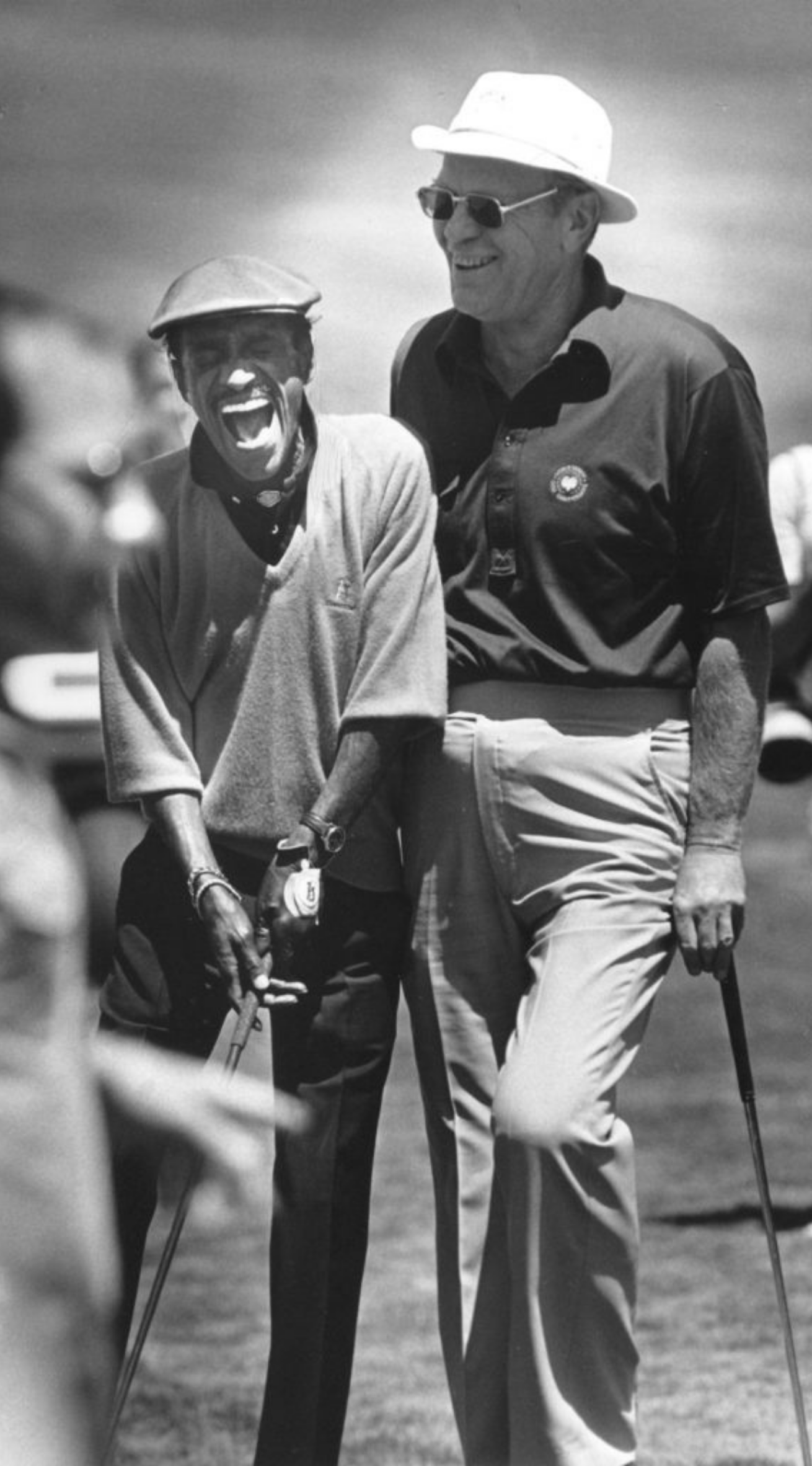Former President Gerald Ford on the golf course with Sammy Davis Jr. Photo by John Long and the Hartford Courant. Copyright 2021. Hartford Courant. Used with Permission.
Golf is unlike most other sports, in which fans cheer during the competition. All is quiet on the course when players tee off or attempt to sink a putt. It has been a sport predominately played by white athletes.
But the success of Connecticut’s long-standing golf tournament — known now as the Travelers Championship — came about in large part due to an African American entertainer: Sammy Davis Jr.
The Travelers Championship, set for June 21-27 at TPC River Highlands in Cromwell, is again expected to welcome some of the world’s top golfers while bringing in money for charity. The tournament’s rise to prominence and high profile may be attributed in large part to Davis, and his link to the tournament for many years throughout the 1970s and 80s.
Dan Kleinman, who has been involved with the tournament for more than 50 years, credits the involvement of Davis with the growth, success and, in part, the sustainment of the tournament.
Kleinman is the chairman of the board of directors for the Greater Hartford Community Foundation Inc., whose primary fundraising activity is the Travelers tournament. Kleinman became president of the Greater Hartford Jaycees in 1973, the first year Davis Jr. became involved.
The Jaycees were the original group that, for decades, did a great deal of work to raise money for the tournament, which had no title sponsor. The Jaycees volunteered to organize and put on the tourney, and their work and dedication was essential to it taking place.
Kleinman and David DeBassio, both partners with Hinckley Allen, serve on the tournament’s board. Hinckley Allen is the legal counsel of the tournament.
Kleinman recalls that the late Joe Dey, then the commissioner of the PGA Tour, called Marv Lapuk, a former chairman of the tournament and the Jaycees’ representative to the American Golf Sponsors Association, and got the ball rolling to have a celebrity name associated with the tourney.
“We were always looking for ways to expand the footprint of the tournament — to make it better,” Kleinman says.
Davis had ties to Hartford and jumped to the opportunity to become involved in the tournament. He represented the Highway Safety Foundation after having lost an eye in an accident, but also took pride in representing African Americans and had a chance to become the first black person to have his name associated with a PGA Tour event, Kleinman says.
The tournament, which originated as the Insurance City Open in 1952, already had appeal; it was where Arnold Palmer won his first PGA event in the United States in 1956.
“He wanted to have his name on the tournament. I think it was important to him personally, and it represented something in this country,” Kleinman said of Davis. “Sammy wanted to encourage more black youth to pick up the game.”
Kleinman said because other celebrities, including Davis’ friends, had their names associated with tournaments, his ego gave him the drive to have his name on one as well.
The late Bob Saunders, former chairman of the tournament, served as a liaison between the tournament and celebrities. Kleinman and Lapuk worked together, both as law partners and to make the golf tournament happen.
Davis’ ties to Hartford dated back to when he performed as a child with his father at the Grand Theatre in Hartford before becoming famous as part of the Rat Pack. “He knew Hartford because he performed in Hartford,” says Kleinman, describing Davis’ connection with the city as a kinship of sorts.
“He was one of the great entertainers of his generation … a great all-around performer,” Kleinman says. “He could sing and he could dance and he could act.”
Bringing the Spotlight to Connecticut
The tournament gained national television exposure soon after Davis Jr came on board. Prior to his involvement it was only broadcast on WFSB out of Hartford.
“We were never on national TV before,” says Kleinman, adding that the revenue this newfound exposure through TV produced elevated the tourney to new heights.
The tournament had a purse of $125,000 the year before Davis came on board, and increased to $200,000 his first year. In 1973, the winner’s share was $40,000. Today, the winner’s share is over $1.3 million and the total prize money is $7.4 million.
So how is it that Davis made such a huge impact on the once-modest golf tourney? He wanted to get stars for a Celebrity Pro-Am, and so began a new era.
“He wanted jumbos — really big names,” Kleinman says. “We never had a Celebrity Pro-Am.”
Yogi Berra, Lawrence Taylor, Michael Jordan, Julius “Dr. J” Erving, Jackie Gleason, Mikey Rooney, Bob Hope and other world-famous people came to the tournament to help make an event out of it.
Davis put on a show each year, to perform for sponsors and golfers and their families, and caddies. The celebrities played and performed at the event as well.
“No celebrity ever did [before] that and he didn’t charge for anything,” says Kleinman, adding Davis also forfeited a week of paid performances in Las Vegas to make this tournament special. “It was important to be in Hartford, for his image and for the black community.
“It was the highlight of the week,” Kleinman says of the show he put on. “He elevated the stature of the tournament to a much, much higher level than we ever had before.”
Davis had a 16-year run with the tournament that ended in 1988 due to health issues, Kleinman says.
As the years and decades went by, the tournament transitioned and gained more corporate sponsorship. From its inception in 1952, the tournament has had a connection with Travelers. It started out as the Insurance City Open because a consortium of insurance companies sponsored the event; it held that name until 1967.
There was a notable African American tie to the tourney before Davis Jr. stepped (or maybe danced) in. Back in 1967, Charles Sifford won the championship, becoming the first African American golfer to win a PGA Tour event. That was the first year it was known as the Greater Hartford Open.
In 1984, the tourney moved to its current location, the TPC River Highlands. Curtis Strange won the “Last Blast at Wethersfield,” the final year of the tourney at Wethersfield Country Club.
Named the Sammy Davis Jr. Hartford Open from 1973 until 1984, it became known as the Canon Sammy Davis Jr. Hartford Open in 1985 and, upon Davis Jr.’s tenure ending, was known only as the Canon Greater Hartford Open from 1989 to 2003. In 2003, it was simply the Greater Hartford Open, but picked up the Buick Championship name from 2004-06. It has been called the Travelers Championship since 2007.
The tournament has generated more than $44 million for charity, with Hole in the Wall Gang a main recipient, since its inception in 1952.
“No other sport does what the PGA Tour does,” Kleinman says, noting 100 percent of proceeds go to charity. “It’s all because of Sammy Davis Jr. — his talent, his prestige.”
Known more for his song “The Candy Man” than sinking putts, you might wonder about the golf-playing abilities of Davis.
He was not the best golfer in the world when he first came to Connecticut for the tournament, Kleinman recalls. He did, of course, have plenty of pizazz with a specially-outfitted golf court. “By the end of his 16 years he became a much better golfer,” Kleinman says.
Kleinman believes that, without Davis’ impact on the tournament, things would be a lot different in Connecticut’s golfing scene. He adds that after the performer lifted the tournament to a high level, Travelers saved it.
The first year of the Travelers Championship was one to remember as Hunter Mahan outlasted Jay Williamson in a playoff. There have been some thrilling championships; memorable Pro-Ams, which continue to be held; and lots of fundraising along with all of it throughout the years. It all started with the Jaycees, and Travelers has been a big — now essential — part of it. And Davis played a large role too.
“If Sammy Davis Jr. hadn’t elevated the stature of the tournament, we wouldn’t have a tournament today,” Kleinman says. “We wouldn’t be here today without the tradition Sammy helped to create here in Hartford.”








More Stories
Haunted Apples and Bewitched Beer
Gayle King speaks to Dennis House
Everybody Remembers Their First Outdoor Concert